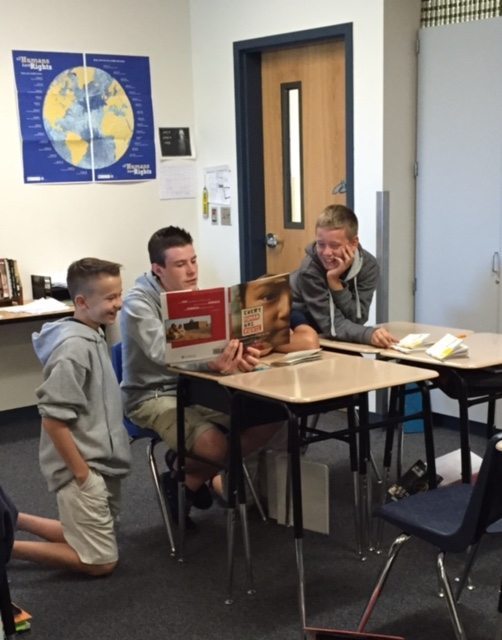Impact Grants
Return to Impact Grants
Understanding Human Rights with Free?: Stories about Human Rights
recipients: Nicholas Darlington, First Sage Valley Middle School, Caldwell, Idaho
date: Completion January 2016
Nicholas Darlinton, an eighth grade English teacher at First Sage Valley Middle School in Caldwell, Idaho, believes in the value of teaching the Universal Declaration of Human Rights through the lens of literature. Yet he struggled for years to find the right stories in the student reader that would bring the individual rights to life for his students. With a mini-grant from the Memorial Library, he was finally able to change that by purchasing copies of the anthology Free?: Stories about Human Rights for use in eighth grade classrooms throughout his district. In a short time, the collection proved its mettle, enabling both general and special education teachers to anchor their mandated genocide units and other explorations of social justice issues in meaningful literary selections.
Over the course of the school year, all eighth grade students in the district study the Civil Rights Movement, the Holocaust, and several recent examples of genocide, but they now have the stories in Free? to make those periods in history more accessible to them. The anthology’s mentor texts guide them as they write their own stories, both fiction and non-fiction, in which they contemplate human rights and the historic movements that have denied them. Through the processes of revision and sharing, students also engage in rich conversations, working together and exposing one another to the breadth of the human rights covered by the Universal Declaration of Human Rights.
“Students simply grasp the meaning of human rights better within the context of a story, especially as they grapple with such difficult periods from the past,” says Nicholas, who attended the Library’s Satellite Seminar in Boise. “Free? has made this kind of powerful classroom dialogue possible.”

Students in Nicholas Darlinton’s class in Sage Valley, Idaho, participate in an in-depth study of the Holocaust and human rights.
